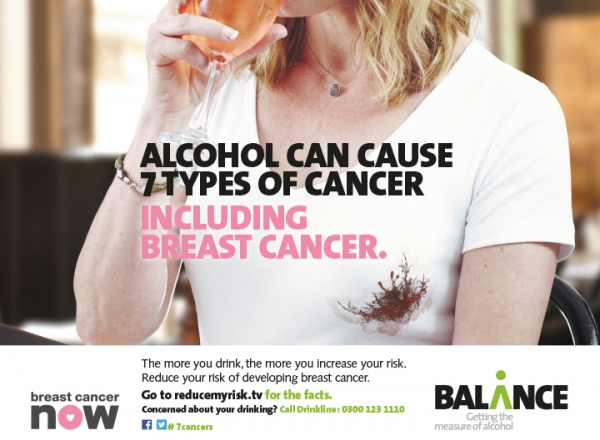Balance calls for mandatory health warnings on alcohol products
The North East has the highest rate of alcohol-related cancer hospital admissions in England and it’s rising, according to new figures.
Figures released by Balance, the North East Alcohol Office, reveal that our admissions rate – 254 per 100,000 people – is 48% higher than the national average.
They also show that managing alcohol-related cancer admissions was estimated to cost £12.5m in 2012/13.
The information has prompted Balance to call on the Government to do everything in its power to make health information mandatory on all alcohol products. Despite being classed in the same cancer-causing category as tobacco and asbestos, alcohol is currently exempt from existing labelling legislation.
Colin Shevills, Director of Balance, said: “These findings make for uncomfortable reading and further highlight the need for the hidden harms associated with drinking to be addressed.
“Alcohol is linked to more than 60 medical conditions including cancer. You don’t need to be a heavy drinker to be at risk, drinking a pint of beer or a glass of wine every day can increase the risk of seven types of cancer and the more a person drinks, the more they increase their risk.
“We are all entitled to know exactly what we’re putting into our bodies so we can fully assess the risks and make informed choices about how much we drink.”
The calls come as part of Balance’s campaign to raise awareness of the link between alcohol and seven types of cancer including mouth, pharyngeal (upper throat), oesophageal (food pipe), laryngeal (voice box), bowel, breast and liver.
Balance’s figures also reveal concerning rises among some of these cancers:
• In 2012/13 there were 6,378 cancer admissions associated with alcohol in the North East, compared to 5,690 in 2006/07 – a 12% increase.
• A 41% increase in alcohol-related breast cancer admissions between 2006/7 to 2012/13 in the 45-54 age group compared to a national increase of 26%.
• A 41% increase in alcohol-related larynx cancer admissions between 2006/07 to 2012/13 compared to national rise of 8%.
• A 42% increase in women in the 45-54 age group admitted to hospital with alcohol-related cancers between 2006/07 to 2012/13 – the national increase was 22%.
Balance is calling for alcohol products to include nutritional information such as calorie content as well as warnings about how alcohol affects a person’s health.
Under current EU legislation, food products and soft drinks are subject to labelling regulations which mean that information covering ingredients and nutritional value is mandatory. However, alcohol is exempt from these regulations.
Colin added: “There is widespread support for such measures with eight in ten North Easterners saying they would back moves for labels to contain information on how alcohol can affect their health. It’s astonishing that alcohol isn’t subject to the same regulations as everyday foods.
“We recognise that changing packaging regulations is not something that can happen overnight and in the meantime would urge the Government to invest in mass media campaigns warning the public of the risks they are taking by drinking too much.”
Dr Robin Mitchell, Clinical Director for the Northern Strategic Clinical Networks, said: “As alcoholic drinks have the potential to cause harm to health, it is surely correct that consumers should be made aware of these risks. Information of this type is, in my view, essential to allow the public to make properly informed choices in matters that influence health and wellbeing.”
